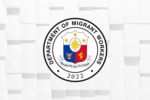Go commend the release of P407.08 million 2021 contingency fund for special risk allowance of health care workers
FILE PHOTO
Senator Christopher “Bong” Go has welcomed the recent approval for the release of additional budget to cover the payment of the second and third batch of COVID-19 Special Risk Allowance for healthcare workers (HCWs).
President Rodrigo Duterte has approved the release of PhP407.08 million in funds charged against the 2021 Contingent Fund to cover the SRA of eligible private HCWs and non-Department of Health plantilla personnel who are directly catering to or in contact with COVID-19 patients from December 20, 2020 to June 30, 2021.
“Nararapat lamang na mabigyan sila ng dagdag na kompensasyon bilang pagkilala sa kanilang sakripisyo. Kailanman ay hindi sila pababayaan ng gobyerno,” he said.
“Ang ating mga medical frontliners ay ang mga sundalo sa gyerang ito. Sila ang tinuturing nating bayani sa laban kontra COVID-19,” he added.
In response to complaints from public and private HCWS who have yet to get their SRA, the President has directed the DOH and the Department of Budget and Management to expedite the delivery of funds for the benefit of the country’s HCWs.
Based on the President’s earlier directive, an initial amount of PhP311.8 million was provided to the DOH to cover the SRA of 20,208 public and private HCWs. With the recently approved PhP407.08 million, the government will be able to cover the SRA of a total of 117,926 more healthcare workers since the President’s pronouncement.
Earlier, Go asked concerned authorities to exercise some flexibility in implementing the terms of the Bayanihan to Recover As One Act, which serves as the legal basis for the SRA.
“Bigyan natin ng sapat na suporta ang medical frontliners. Bawat araw ay nasa panganib ang kanilang buhay. Siguraduhin nating mabibigyan ang lahat ng qualified healthcare workers ng Special Risk Allowance at iba pang insentibo o benepisyo na naaayon sa batas,” appealed Go.
“Kaya ako umaapela na maging flexible tayo sa pag-iimplementa ng nakasaad sa batas at kung kakayanin ng pondo ay bigyan na ang lahat ng qualified ng fixed na amount ng SRA kaysa bilangin pa natin ang kanilang pag-duty bawat araw,” he added.
To guarantee that their contributions and risks are adequately recognized, Go also expressed his support for extending the SRA to all HCWs working in hospitals. Given the significant number of COVID-19 cases accepted in the country’s health care institutions, he pointed out that practically all HCWs fit under the scope of the law’s description.
“Lahat naman ng health workers na naka-duty ay maituturing na exposed sa banta ng COVID-19. Hindi nakikita ang kalaban na ito kung kaya’t mahirap paghiwalayin pa kung sino ang exposed at sino ang hindi,” continued Go.
“Pagdating mo sa ospital, ‘di mo naman masasabi. Once nasa loob ka na, prone at maituturing na exposed ka na rin. Hindi mo masabi na walang virus sa dinaanan mong floor dahil dito lang ang virus kasi hindi nga natin nakikita ang kalaban,” he explained in an earlier interview.
Go went on to say that the government should do everything possible to help HCWs, considering their critical role in fighting the pandemic and preserving lives.
“As much as possible, kung kakayanin naman ng pondo, ibigay na natin lahat ng suportang pwede nating ibigay sa medical frontliners dahil sila naman ang maituturing na mga bayani sa laban na ito,” Go stressed.
To meet the rising demand for health workers, Go had previously invited HCWs working in non-critical areas to volunteer to be deployed to Metro Manila and other crucial areas to help enhance the country’s capacity to combat the epidemic.
In line with this, he launched an initiative to mobilize volunteer medical frontliners in collaboration with the Office of the Presidential Assistant to the Visayas, DOH regional offices, local government units, hospitals with Malasakit Centers, and Project Balik Buhay member-private hospitals.
In 2019, Go was instrumental as author and co-sponsor in the enactment of Republic Act No. 11466 or the Salary Standardization Law 5. The law gives civilian government employees, including nurses, their fifth round of salary increases broken down in tranches.
In the same year, he also pushed and ensured enough funding was allotted for the implementation of a Supreme Court decision upholding Section 32 of the Philippine Nursing Act of 2002 some 18 years after the law was enacted. The law increases the minimum salary grade of the Nurse I position to SG-15. The ruling was implemented the following year.






